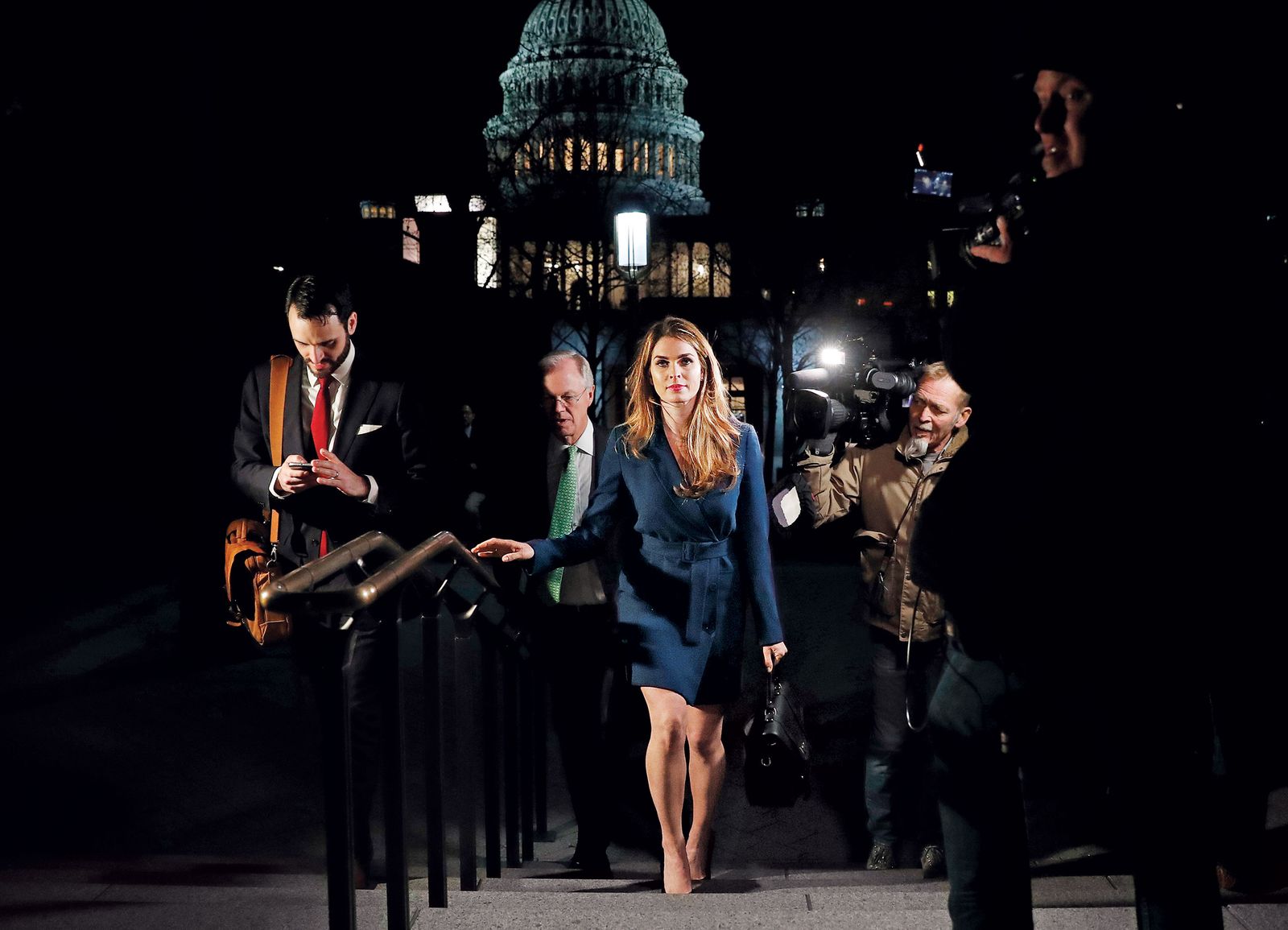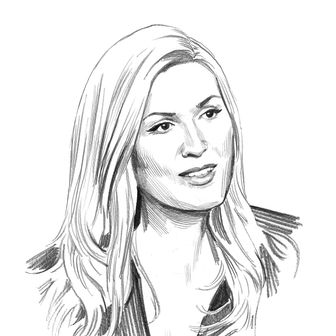On the morning of Wednesday, February 28, Hope Hicks arrived at the White House just after 8 a.m. Within a week, it would be snowing in Washington, D.C., but she was dressed for spring in a bouquet of purple, yellow, and blue, as if willing the end of winter with her miniskirt. She held on to her iPhone in the West Wing, in violation of a rule that normally diverted it to a locker secured by a shiny silver key, then retreated to her office, a first-floor broom closet that in the past had been assigned to presidential secretaries.
When the administration began 13 months before, competition among some staffers had manifested as a struggle for real estate here; Omarosa Manigault, a perennial reality-TV contestant, had gone so far as to steal a room that had been designated for Anthony Scaramucci, “the Mooch,” a hedge-fund millionaire obsessed with astrology and the word fuck, because of its status-confirming glimpse of the Washington Monument. Both of them were eventually fired, along with a procession of others who failed to maneuver the chaotic status hierarchy President Trump seemed to cultivate out of boredom.
A view of duck-tour buses circling the mall wasn’t needed for Hicks to know her standing. What her office lacked in flair it made up for in proximity. While others were left wondering what the president was thinking, Hicks could often hear him shouting, even with her door closed. “Hope!” he’d scream. “Hopey!” “Hopester!” “Get in here!”
Many requests were mundane. “He doesn’t write anything down,” one source close to the White House told me. “He doesn’t type, he dictates. ‘Take this down, take this down: Trump: richest man on Earth.’ ” A second source who meets regularly with the president told me that Hicks acted almost as an embodiment of the faculties the Trump lacked — like memory. “He’ll be talking, and then right in the middle he’ll be like, ‘Hope, what was that … thing?’ ” When the name of a senator or congressman or journalist came up, Trump would prompt Hicks to provide a history of their interactions, asking, “Do we like him?” “And she fucking remembers!” (Trump has said his own memory is “one of the greatest memories of all time.”) “She’s the only person he trusts,” the second source continued. “He doesn’t trust any men and never has. He doesn’t like men, you see. He has no male friends. I was just with one of them the other day, someone who’s described as one of his closest friends, and he doesn’t know him very well. But a small number of women, including his longtime assistant back in New York, he really listens to them — especially if he’s not banging them. Because, like a lot of men but more so, Trump really does compartmentalize the sex and the emotional part.”
Hicks looked around her sepulchral space, outfitted with three mismatched chairs. On the desk was a tiny oil painting by her paternal grandmother, Lucile G. Hicks, an abstract work that looked like the sea or the inside of a cyclone, depending on your point of view. Fresh flowers were delivered by the White House florist each week; today they were pale-pink roses. With the president a motorcade ride away on Capitol Hill at the memorial of “the GREAT” Reverend Billy Graham, there was relative quiet.
Hicks took out one of her notebooks, black leather with the Trump name embossed in gold on the front. She’d prayed a lot over the weekend, and also written two lists in the same bubbly print that had recently been photographed on a note card in Trump’s hand, reminding him to tell survivors of a school shooting, among other things, “I hear you.” One list contained reasons to resign as White House communications director immediately; the other, reasons to wait to resign. Not resigning at all wasn’t a consideration.
She’d come close twice before. Over dinner in Bedminster in early August, she told Jared Kushner and Ivanka Trump that she was unhappy. She’d thought that being in the White House would feel different than the campaign, but instead, surrounded by eccentrics, maniacs, divas, and guys from the Republican National Committee who seemed to think they were managing a Best Buy in Kenosha, it was somehow sicker there in the stillness of it all. She suggested removing herself from the belly of the psychodrama to work elsewhere in the administration. Sharing her frustrations, Jared and Ivanka engaged her idea with caution; they asked her to give General John Kelly, the new chief of staff, a chance to change the West Wing for the better.
But as time went on, it became clear that the sickness was a feature, that anyone who entered the building became a little sick themselves. And no matter how dead any of the eccentrics or maniacs or divas appeared to be, how far away from the president their status as fired or resigned or never-hired-in-the-first-place should have logically rendered them, nobody was ever truly gone. The people who were problems on the campaign or on the inside continued to be problems. The president’s taste for the other and the new was so established that the most driven among them knew that all they had to do was wait for an opening, or shrewdly create one — a weakened staffer, a particularly demoralizing news cycle — and they could worm their way back in. The madness engulfing the White House, in other words, was not just a matter of staff infighting or factional ideological rivalries, as it was often portrayed in the press, but also, in part, the result of manipulation from the fringes of Trumpworld. In early December, Hicks had seriously considered resigning again. When her apartment’s annual lease came up for renewal, she couldn’t bring herself to sign the papers. Instead, she signed a six-month lease at a significant cost inflation.
Over the weekend, she had sketched out in her notebook various courses of action and how they might play in the press. If she resigned immediately, the assumption would be that it was the result of the bad news that had defined the winter. There was the question of her legal exposure in the special-counsel investigation into Russia’s interference in the election; already, she’d been interviewed by Robert Mueller and had appeared before the Senate Intelligence Committee. “She’s never failed to impress me, and I’m not an easy guy to impress, historically. I’m not a cheerleader,” White House counsel Ty Cobb told me. “She’s sort of the last person on my list that I worry about.” Yet Hicks surfaced at pivotal moments that were of interest to investigators, and she was now being mentioned along with phrases like obstruction. Soon she’d testify in the House, where she would take questions for nine hours, one moment of which, when it leaked — her admission that she’d told “white lies” on her boss’s behalf — made headlines around the globe (some suggesting the president was furious with her). And then there was her personal life, which, with a tabloid story that swelled into a background check and classified-information scandal, had collided with the country’s national security in a way that rarely happens outside Netflix.
Yet, if she waited, she probably couldn’t avoid the impression that she was leaving because of a crisis, because there was always a crisis. If she’d resigned in August, they’d have said it was owed to Charlottesville. In December? Mueller or Roy Moore. January? Fire and Fury. From a public-relations perspective, there would never be a right moment to leave, but public relations as it’s traditionally understood had almost no relevance in this White House. By Sunday, her gut had decided for her what her head couldn’t.
When the president returned from the Capitol around noon, Hicks opened her office door, which clasps with a ring at its center, and walked about ten feet to her right, into the Oval Office. Before she could finish resigning, Trump interrupted her. He told her that he cared about her happiness, that he understood her decision, and he would help her do anything she wanted to do in her life. He said he hoped she would go make a lot of money. He also said he hoped that she would come back at some point.
Then the president added something else: “I’m sorry for everything you’ve been through.”
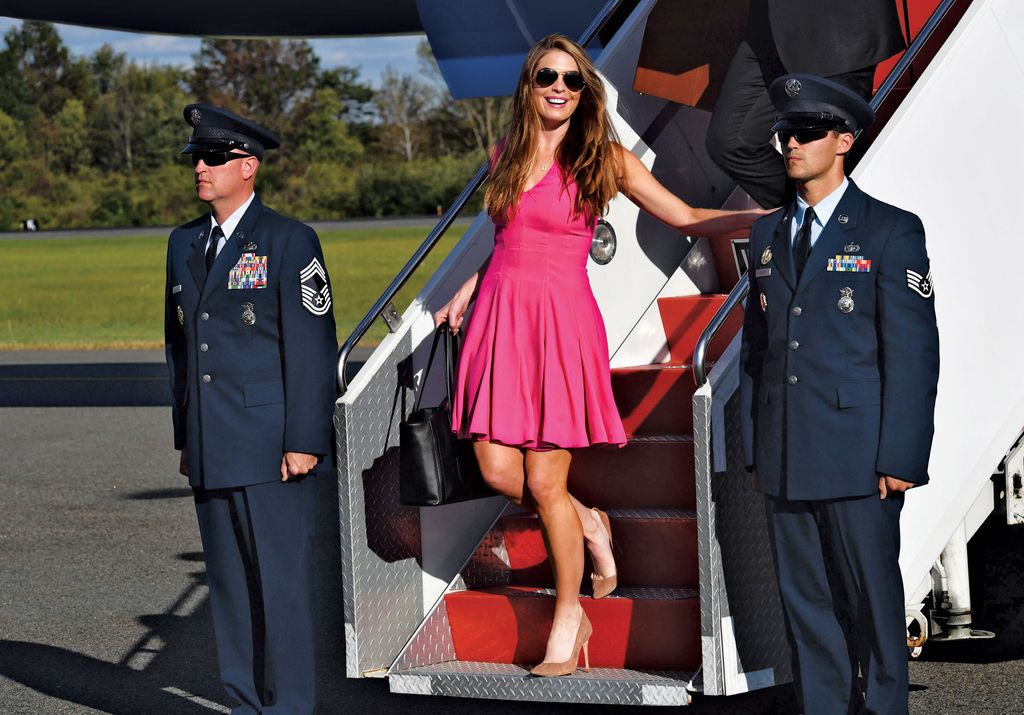
Hope Hicks wasn’t a victim; on this both her allies and critics agreed. She didn’t faint in a field of poppies and wake to find herself on Donald Trump’s campaign, 35,000 feet up and strapped in aboard a Boeing 757. Over the course of three years, she’d spent more time with Trump than anyone, more than his own children and his wife, and she acknowledged his flaws and idiosyncrasies. She had made her choices knowingly, even if she couldn’t know where they’d lead her. But she believed Trump was a good person, and she was angered that his critics didn’t seem open to the parts of his personality that would lead them to believe the same. To Hicks, the president’s policies were secondary considerations — the man himself came first. And at the end of the day, she really liked him. “Part of it is because of the proximity,” a source close to her said, “part of it is human nature.” She even sounded a little like him sometimes, uttering words like loser in her sugary voice.
It would require an extraordinary sequence of events for her to finally quit. According to dozens of interviews conducted, over five weeks, with more than 30 current and former senior White House officials, administration officials, campaign officials, and individuals close to the president, in addition to sources with direct knowledge of these circumstances, what Hicks “went through,” to borrow the words of the president, wasn’t really about her at all. She was something more like a pawn in a campaign to upend the White House from afar.
“When I decided to run for president, I said, ‘Hope, lots of luck, hang on!’ ” Trump told me once. It was April 2016, and we were in his office in Trump Tower. He hadn’t yet secured the Republican nomination, but he was about to, and I was there to talk to him about his uncommonly press-shy press secretary, who sat in silence beside me, radiating discomfort. While nearly everyone else associated with the campaign seemed to think of it primarily as an opportunity to get on TV, Hicks feared attention, a quality that worked in her favor — her boss wanted all the attention for himself — until it didn’t.
Hicks was 26 years old in 2015 when she was called to the same office, high above 57th and Fifth, and asked to accompany the future president someplace she’d never been: a political event (the Iowa Freedom Summit) in a caucus state. She didn’t overanalyze her decision to join the campaign, thinking of it almost the way you’d think about a semester studying abroad. “The feeling was, You know what? I’m just going to roll with it. Let’s see what happens until the election,” a source who has known her since before the campaign told me. “She wasn’t someone who was in it for the politics. She was in it because of the person, and the relationship with the family, and the experience.”
Hicks was raised in Greenwich; PR and politics were recurring themes in her family. Her maternal grandfather, G.W.F. “Dutch” Cavender, had served in the Department of Agriculture under Lyndon Johnson and Richard Nixon; her maternal grandmother, Marilee Cavender, had worked at the Department of Transportation; her mother, Caye Cavender Hicks, had been an aide to Ed Jones, a Democratic congressman from Tennessee; her father, Paul Hicks, was the spokesman for the NFL. He’d once worked as an aide to Stewart B. McKinney, a Republican congressman from Connecticut, and, in the ’80s, had served as part of the local Greenwich government.
That Hicks could bridge this Republican Establishment to the very anti-Establishment Trump was invaluable to the insurgent candidate. “Does Donald Trump go and become an effective social figure in Hope’s world? No,” said a source close to the president. “People would be like, ‘What? Fuck you.’ By the way, they’ve already said ‘Fuck you,’ which was the whole point of Trump running.”
Hicks spent her childhood playing lacrosse and modeling for tween book covers and children’s clothing, often leaving public school to drive with her mother into Manhattan for go-sees, then heading back to school in time for practice. In the handful of years after graduating from Southern Methodist with a B.A. in English, she waded into the family business, working for the publicist Matthew Hiltzik, a former Clinton operative and Miramax executive whose communications firm had clients ranging from Justin Bieber to Glenn Beck.
She met Hiltzik in Texas during Super Bowl XLV, at a tailgate with Alec Baldwin, who starred in a movie Hicks had auditioned for. (“How odd,” Baldwin told me when I asked him to provide his memory of the meeting. “I have no recollection of that.”) But Hicks made an impression on Baldwin’s then-rep, and within a few years, she was handling the Trump Organization account at Hiltzik Strategies and working closely with Ivanka Trump, who at the time was hustling a lifestyle brand.
By then, Hicks had the trust of the family, which meant she had the trust of The Donald. This, combined with the fact that she was the only founding staff member who didn’t look like a relative of Louie De Palma, made the earliest days of the campaign play out like a season of The Bachelorette: Apprentice. It was an ensemble of two-bit villains, but even among them, the former campaign manager Corey Lewandowski, who departed after allegedly grabbing a reporter’s arm at a press conference, stood out.
Sam Nunberg, the screwy adviser you may recall from his recent decision to appear on live TV, possibly while drunk, to encourage special investigators to arrest him and to announce, in this publication, that Trump has a “fat ass,” today maintains that Lewandowski was to blame for getting him fired two months into the campaign (already, Nunberg had been fired and rehired, then fired and rehired again by Trump). Nunberg believes it was Lewandowski who leaked to the press racist social-media posts he’d made seven years prior, and that it was Lewandowski, in coordination with Hicks, who ignored Trump’s promise to keep the firing quiet (they released a statement labeling him a “low level” operative).
In response, Nunberg went nuclear, accusing Lewandowski and Hicks in court documents of having an affair, after Trump sued him for violating an NDA. It was intended to hurt Lewandowski more than Hicks, but the former didn’t seem to mind; he never made any effort to deny the accusation, and privately, he encouraged it. (Michael Wolff reported the affair as fact in Fire and Fury.)
For Lewandowski, there would be many more Nunbergs to deal with throughout the campaign, or people whom the president liked, for some reason, and who were thus a threat. This included Paul Manafort, a comically wicked creature of the Washington Establishment who made a career lobbying for foreign dictators, hired in April 2016 to help with delegates at the Republican convention. When Lewandowski was fired in late June — the result of a coup led by Trump’s children — Manafort became the campaign chairman. But Lewandowski refused to accede to his exile, and in the days leading up to the election, when Kellyanne Conway and Stephen Bannon were leading the campaign after Manafort had been fired, he made an unofficial return, traveling on the plane with the candidate.
He’d been there in the beginning, and he believed he was owed a big piece of what came next. “He didn’t really want any responsibility. He just wants to be able to be with the president and just do whatever he wants him to do,” a source who worked with Lewandowski and is close to the White House told me. “He’s been very focused, from day one, to get into the White House.”
There were some issues, of course. Lewandowski had fallen out with Hicks; he was hated by the family; and, when John Kelly joined the White House, Lewandowski quickly developed a conflict with him, a stricter gatekeeper than the previous chief of staff. But Lewandowski did have something important going for him: Although nobody could really explain why, the president liked him. When Kelly prevented him from entering the White House in January, “the president was upset,” according to a former senior White House official. “He complained extensively about Why wasn’t Corey allowed in!”
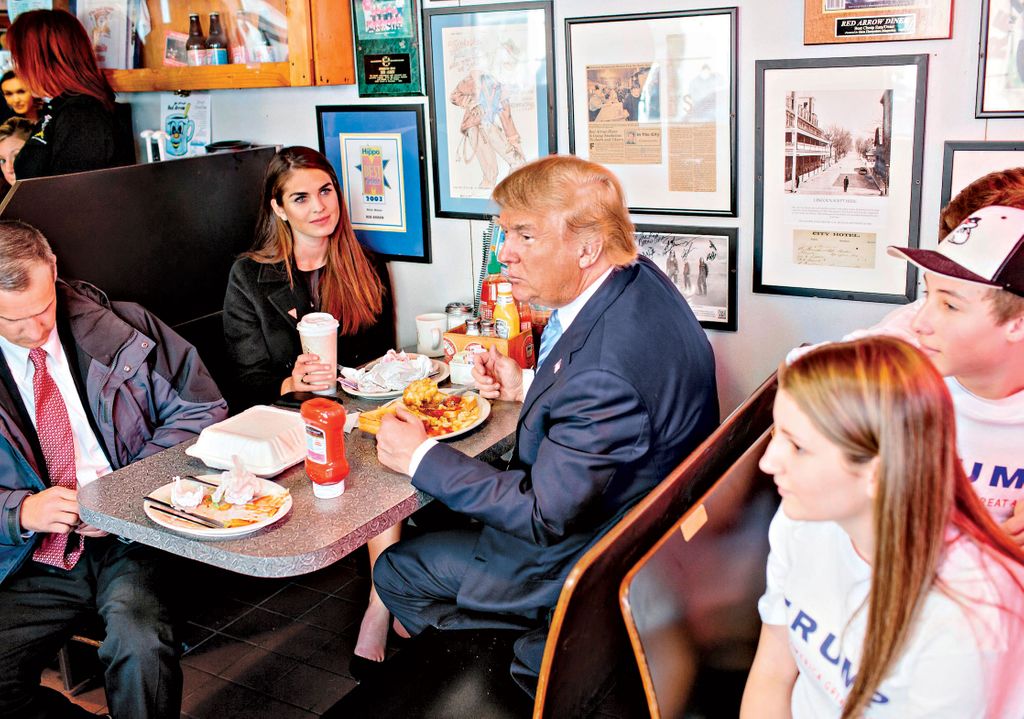
From the time Hicks arrived in Washington, her existence had been an insular one, confined to a radius of only a few blocks past the White House, where she worked 15-hour shifts punctuated by crises and presidential decrees-by-tweet.
She woke at 4 a.m.; responded to emails from the night before; read the bookmarked articles she’d been meaning to get to; met her trainer in the 3,200-square-foot gym on the first floor of her building; and arrived early at the northern gate, usually by 7:30 a.m.
But on a Saturday night in late January, Hicks left her apartment and went to Hogan Gidley’s home. Gidley, who lived nearby, was a deputy press secretary brought on to the White House staff in October by Sarah Huckabee Sanders, whose father, Mike Huckabee, was Gidley’s former boss. Gidley and Hicks shared a love of Tommy Boy and mint candies, and they became fast friends. They were joined at Gidley’s house by Josh Raffel, who was considered the White House spokesman for Jared and Ivanka; Hicks had worked with him at Hiltzik Strategies and considered him her best friend. They were also joined by Rob Porter, the White House staff secretary Hicks had been dating since the fall. At the last minute, the group decided to meet Raj Shah, another deputy press secretary, to get dinner at Rosa Mexicano.
They were unaware that they were not alone. Throughout the course of the evening, their every movement was being watched: Outside Hicks’s apartment, at Gidley’s home, outside the restaurant, walking into the lobby of her apartment building. Each moment was documented in photos and video, even through the window in the back of the cab home. Hicks was being tailed by a group called Probe-Media, “an elite agency” that “deals in exclusive material and provides images and video footage and reconnaissance in a service uniquely tailored to meet our clients’ needs,” according to the company’s sparse website.
Probe-Media offers what it refers to as “a bespoke service” to “international news outlets, intelligence agencies and corporate and individual clients.” Perhaps by design, basic information about Probe-Media is difficult to locate. The o in its logo is a lens, and above the company’s name is an outline of a skyline in which the Statue of Liberty sprouts from the middle of a block of suburban houses and urban buildings. When I reached out through a form on the website, I received a response sent from an iPhone. “Yes it was us that got the pictures and yes they did lead to further events but the process how the shots were taken cannot be discussed as that’s why we get commissioned for our deep surveillance approach and discretion,” read another response. “Thank you for reaching out though, Kind regards, The team at Probe-media.”
Five days after the dinner, on February 1, grainy images of Hicks and Porter taken by Probe-Media were published by the Daily Mail, a tabloid based in the U.K. At first, the story seemed unimportant, even if it was a sign of the times to see it show up in the Mail. Trump was a creation of the Daily News and the New York Post, but not since the Lewinsky scandal had there been so much tabloid interest in Washington, where the Mail now has a robust presence, including a respected investigative reporter, a White House correspondent, and a string of freelance photographers who, since the inauguration, have staked out the Kalorama home of Jared and Ivanka for a near-daily report on Ivanka’s outfits.
The Daily Mail story outing Hicks and Porter as a couple was written by a New York–based reporter named Martin Gould, a tabloid veteran who in 1997 was charged with driving Victoria Gifford Kennedy, the estranged wife of Michael Kennedy, off the road in pursuit of a photo after she’d left her husband over his affair with their babysitter. Gould had worked for Star magazine and at Newsmax, an outlet owned by Christopher Ruddy, a confidant of the president’s.
The story called Hicks and Porter a “red-hot couple,” quoting an “eyewitness”: “As soon as the taxi took off they both moved from their sides of the cab to the middle. Rob was kissing Hope’s neck all the way home.”
“I think covering the love life of two single people in any administration is just ridiculous,” Gidley told me. “People are literally staked outside of her house. People literally follow her around town. People literally stare at her whenever she’s out. That’s enough to make, you know …” he paused. “Britney Spears shaved her head and hit a car with an umbrella, right?”
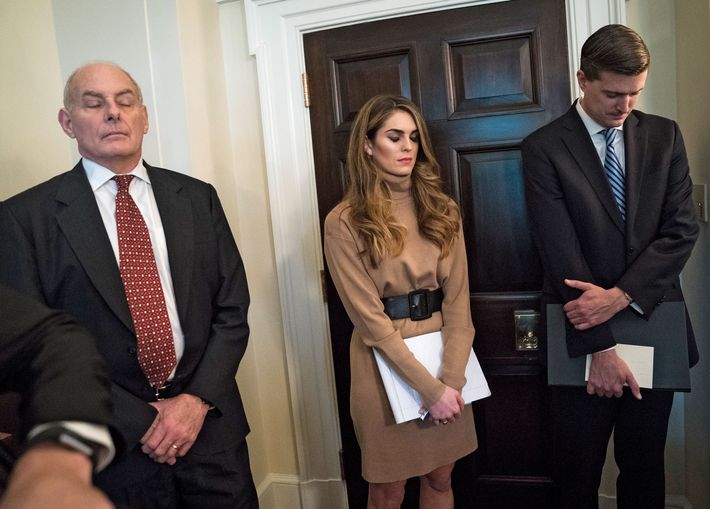
Rob Porter was a Harvard-educated Mormon with good manners and what seemed like a gentle nature, but at only 40 years old, he’d already been married and divorced twice. He’d also been entangled in an on-and-off relationship with another administration official, and within their D.C. social circle — which as of Inauguration Day included some of the most powerful people in the country — their private woes were well known. The fact that Porter was dating Hicks entered the capital’s gossip stream at the same time, too.
In late November, the official read private messages Porter had exchanged with Hicks, where the nature of their relationship was revealed plainly. She informed Porter’s colleague, White House counsel Don McGahn, whom she knew. She also told McGahn that Porter had issues relating to violence in his two marriages.
The White House didn’t need the tip. Although the public wouldn’t know it for over a year, the FBI began interviewing Porter’s former wives beginning in January 2017, as part of a background check for his security clearance. Colbie Holderness, his first wife, would later tell The Intercept that, days before she met with the FBI, a friend of Porter’s approached her current husband to tell him that she was “not obligated” to tell them anything, but Holderness disclosed to the FBI that during their marriage, Porter abused her physically and emotionally. Jennifer Willoughby, his second wife, did the same. The FBI informed the White House, and deep into the first year of the new presidency, Porter hadn’t been granted a high-level security clearance, which was a hindrance; as staff secretary, documents intended for the president flowed through him, and yet on at least one occasion, Porter’s request for documents was denied. The White House would go on to claim ignorance and to claim that Porter’s background check was ongoing. But in January, according to FBI testimony, the White House was handed the bureau’s final review on the matter. Porter maintained only an interim clearance.
In April, Willoughby posted a blog on her personal website that mentioned physical abuse she’d suffered in a past relationship. Porter wasn’t identified by name, but it worried him that it was out there at all. When he repeatedly asked her to take it down, she refused; she didn’t see how anyone would ever care enough to dig it up, and even if they did, she’d managed to forgive him.
In late January, Porter called Willoughby, frantic and paranoid, and asked her a final time to remove the post. “He did not name names, but he implied that there was a former staffer from the White House who was unhappy with him and was out to get him and take him down and somehow had gotten wind of my blog post,” she said. “He’s demanding that I take it down and telling me that this former staffer is going to send it to the media.” Willoughby assumed that Porter was talking about Bannon, because he had specifically mentioned “how ‘he’ was angry Rob had blocked him in getting his ideas, or ‘racist agenda,’ pushed through,” she said. But later, she came to believe Porter was talking about Lewandowski, even though Lewandowski had never formally worked in the White House.
As it happened, Lewandowski lived in a townhouse he shared with a former Trump-campaign operative who worked at the same government agency as the official Porter dated. (If this thread is starting to feel tangled — it is.) The townhouse belonged to Citizens United, the conservative group run by veteran right-wing agitator David Bossie, though Politico had christened it “The Lewandowski Embassy.” Lewandowski occupied the top floor while his roommate dwelled in the basement apartment. In between were the offices of Turnberry Solutions, a lobbying group founded by former staff from Lewandowski’s old lobbying group. (Lewandowski, who hasn’t registered as a lobbyist in several years, claims to have no involvement with Turnberry Solutions.) Lions, light-pink roses, and a phrase from Isaiah 35, repeated three times, decorate the corridor leading past the entrance: THE WILDERNESS SHALL BLOSSOM AS THE ROSE.
On February 5, four days after the Daily Mail disclosed the “red-hot” relationship between Hicks and Porter, two reporters contacted Willoughby after receiving tips about her blog. Willoughby told Porter about the calls, she said, and agreed to negotiate a joint statement. But there were two phrases Porter pushed for that Willoughby told me she couldn’t stomach: “didn’t accurately depict my marriage,” and “it was a therapeutic post in which I took many liberties.” Willoughby had already talked to the Mail, and she and Porter stopped negotiating; they never put out a joint statement.
The following day, the Mail published interviews with Porter’s former wives, in which they claimed they’d been physically, verbally, and emotionally abused (Porter responded to the story by saying, “Many of these allegations are slanderous and simply false”), and that they’d informed the FBI — to apparently little effect.
The report prompted Hicks and Porter to break up, but the feeling around Washington was that the saga was the product of some political spycraft. “This had been planned and choreographed and coordinated and known long in advance by a group of people who were trying to play political games,” a source with direct knowledge of the events said, “knowing that this would be part of a larger story related to security clearances and John Kelly and others, seeking to sow chaos and dissension. They saw this as a useful catalyst, which it turned out to be.”
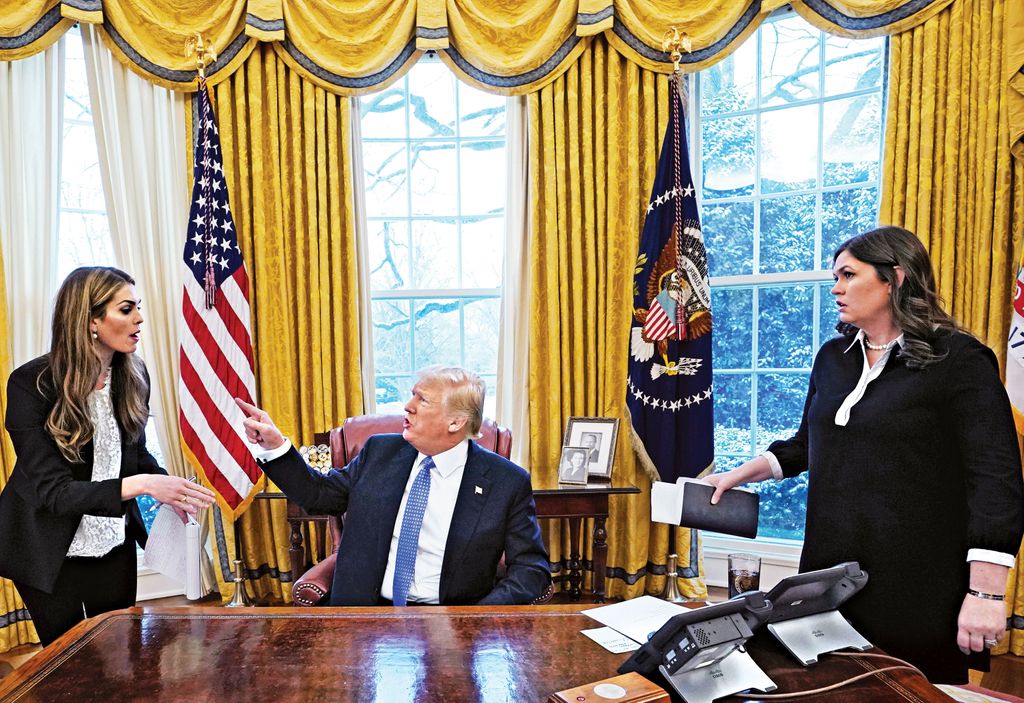
For as long as he’d been in politics, Lewandowski had been defined by two qualities: his ruthless pursuit of an enemy’s destruction and always having an enemy. This was true even when it was small ball; in New Hampshire, he once fucked over a local official by claiming that his fantasy-football league, with a grand prize of $200, was an illegal gambling ring. By the time Lewandowski was done, the official had lost his job and was the subject of a criminal probe.
There were plenty of reasons for Lewandowski to consider Porter his enemy. Whatever was or wasn’t true about his relationship with Hicks, Lewandowski’s unusual preoccupation with her was well established. “He has, sort of, Single White Male characteristics,” a source who had worked with Hicks before the campaign told me. In the fall, he began asking around, trying to figure out whom she was dating. “I think that he thinks he should control her,” a second source said. “He got wind that she was dating Porter, and he could not handle that,” a third source, who is close to the White House and worked with Lewandowski, said. “There were still raw feelings.”
Complementary to Lewandowski’s hatred of Porter was his rivalry with John Kelly. To establish order in the West Wing, Kelly had made the president less accessible to outsiders and outside information less accessible to him. A source close to the White House said that, soon after Bannon was fired in August, he became high on the idea of seeing Kelly replaced with a combination of Lewandowski and Bossie, who had co-authored a book called Let Trump Be Trump. They would be the ideal gatekeepers for people who would otherwise need to jump the gate.
During the campaign, Charles “Chuck” Johnson, an early supporter of Ted Cruz, said Lewandowski tried to hire him to do opposition research. Johnson said he declined the offer but that he and Lewandowski remained friends. Periodically, Johnson would use his website GotNews to prop Lewandowski up, once announcing, when there were murmurs he might work in the White House, “HE’S BACK!”
Johnson liked to call himself a journalist and “debunker of frauds,” but he was known primarily as a pervasive far-right menace, an oddity with few personal boundaries who’d once raised $150,000 for a neo-Nazi’s legal defense fund. In 2012, he had promoted unfounded accusations involving underage prostitutes and Bob Menendez, the Democratic senator from New Jersey, on the conservative website the Daily Caller. At the time, the publication’s executive editor overseeing the Menendez coverage was David Martosko. Today, Martosko is the political editor of the Daily Mail. About the Daily Mail’s Porter scoop, “I don’t know what I’m allowed to say,” Johnson told me. “Probe-Media, from my understanding, is going to be doing a lot more work with private eyes.”
Johnson was always taking credit for things he didn’t seem to have any connection to. He was usually wrong, but he did seem to know things, sometimes, that turned out to be true, and, sometimes, he seemed to know them before anyone else. He also seemed to benefit from the fact that the new administration was populated by people who hadn’t been following politics very closely in recent years. He claimed he knew about Porter months in advance of the stories, and that some mysterious “we” was pleased with how things unfurled, even if he was surprised it took so long. Johnson said Lewandowski had nothing to do with the stories and that he wasn’t among the people he’d told about Porter. (Reached repeatedly for comment, Lewandowski did not answer questions.)
Political genius wasn’t required to predict that the White House would respond to the Porter news by somehow making it even worse news. The story about Porter and Hicks became the story about Porter and the women who said he abused them. That became a story about the White House covering up Porter’s secrets, which became a story about Hicks and Kelly, which became a story about Hicks and Trump, which became a story about security clearance and Jared and Ivanka, which became a story about Kelly again. Eventually, it was just a story about who populates our anarchic new government and whether or not we can trust them.
In the past month, since Hicks’s resignation, the administration has entered into a new level of disorder, with the departures of Gary Cohn, the president’s top economic adviser, and the secretary of State, Rex Tillerson, who was fired in a tweet. For emphasis, Trump also fired one of Tillerson’s aides. Next, he fired John McEntee, a longtime personal aide whose security clearance had been revoked (though he was immediately hired by the Trump 2020 campaign). Kelly, national-security adviser H. R. McMaster, and Attorney General Jeff Sessions have all been rumored to be next. There are many possible explanations for this new chaos — pressure from the Mueller investigation, burnout from a very messy year, the president’s frustrations with the “adults in the room” and his eagerness to replace them with people he knows are his people. But the drama surrounding Hicks, for several years now Trump’s most trusted confidante, was inarguably a trigger, too.
The first story about the Porter allegations contained statements from the White House defending his character. Kelly’s read, “Rob Porter is a man of true integrity and honor, and I can’t say enough good things about him. He is a friend, a confidant and a trusted professional. I am proud to serve alongside him.” It was reported that his words had, in fact, been written by Hicks, and, relatedly, that her involvement was seen internally as a problem: The president was frustrated with her, according to unnamed sources, and her judgment was called into question. But five senior White House officials told me that Kelly dictated the statement himself. “She did not take part in drafting it,” Kellyanne Conway told me. “That’s correct,” Sanders agreed. Yet Kelly allowed Hicks to be blamed and didn’t make an effort to correct the reporting.
For months, sources had been murmuring about Kelly’s preference for the woman who replaced Hicks as director of strategic communications, Mercedes Schlapp. “Mercy” is one half of a Catholic conservative power couple — her husband, Matt Schlapp, is the chairman of the group that hosts the Conservative Political Action Conference — and before she joined the White House, she was a Fox News commentator. “Mercedes has been waging just an incredible war,” the former official said.
A second former senior White House official elaborated: “The battle between Mercedes and Hope was ugly as hell. I mean, Mercedes was fucking cutting her up.” The second official was sure that Kelly would install Mercy in Hope’s place — assuming he doesn’t resign or get fired himself, an important caveat for all White House speculation. “Kelly wanted Hope to move out of the anteroom to the Oval Office and into the communications office,” the first former official said. “He did not like that she had that level of access and influence.”
There was some irony there. Getting Kelly into the West Wing had required a veritable hostage situation dreamed up by Jared and Ivanka, who hired the Mooch as a means of pushing out Reince Priebus, which worked more efficiently than they’d anticipated: Mooch was fired about a week later, and there was a bonus resignation from Sean Spicer, whom they also disliked. By the time the country was becoming fluent in the Mooch’s delightfully goonish parlance, he’d already served his purpose. When he was fired, Hicks was promoted to communications director.
But just as Kelly didn’t understand Jared and Ivanka, he also didn’t understand Hicks, and he sometimes blamed her for habits Trump had been forming for 71 years. “He was extraordinarily dismissive of her. He would refer to her as ‘the high-schooler,’ he would joke about how she was inexperienced, she was in over her head, she was immature,” a former senior White House official told me. “He doesn’t like a woman that potentially has some position of power over him. He thinks women should be subservient to him. If you look at his relationship with Ivanka or Hope — women who aren’t subservient to him — he has problems with those people.”
In conversations with me, Mercy didn’t have a critical word to say about Hicks. She called herself “mother hen” and said it upset her to hear what people were saying about their relationship. “I love that girl and I want her — we really are there for each other.” However, when I asked Mercy about Kelly’s statement, and whether she believed what five of her colleagues had confirmed to me was true, she wouldn’t engage. “I was not involved at all in that process. I was working on the job I was doing, which is my calendar. So I’m not going to comment on it.”
At that point, to Mercy’s relief, Gidley entered the room and the conversation turned to how the staff could be described as characters. If it were Saved by the Bell, they immediately agreed, Hicks would be Kelly Kapowski, “the beautiful one,” Mercy said. “I’m Screech,” Gidley added.
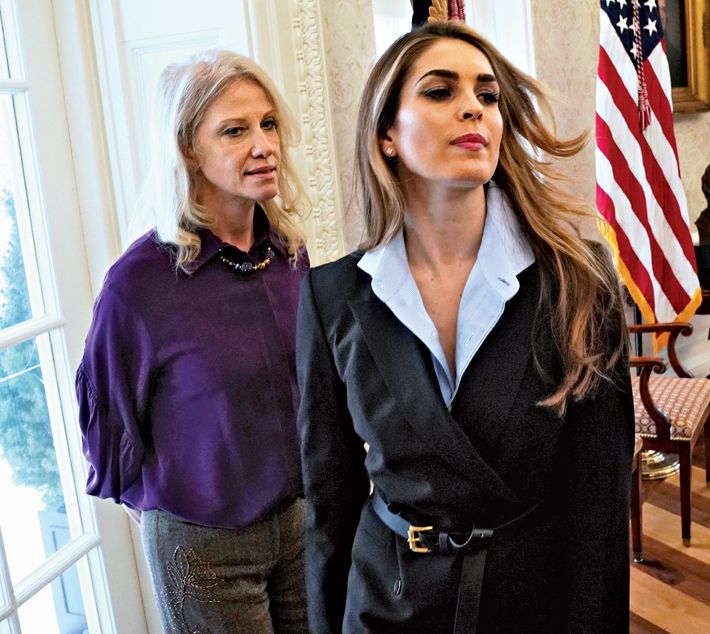
It was the middle of March, and though it had been only 16 days since Hope Hicks had resigned, she was no longer the most recent official to leave the Trump administration — not even close. Still, interest in Hicks was undying. The Daily Mail was stationed almost permanently in front of her apartment building, usually with just one photographer, but sometimes with more. Today, it was Matthew Paul D’Agostino, a freelance photojournalist, idle beside his gekko-green Honda Element, wearing two cameras draped over his chest. On Valentine’s Day, they’d sent several. “She’s gonna make it after all! Hope Hicks is all smiles as she glides out of her DC apartment in white high heels, a low-cut sundress and bare legs (with a self-tanner fail on her feet),” read the headline. Hicks was holding bags from Whole Foods. Inside were the sugar cookies she’d baked and decorated with her mother, Raffel, and Gidley to give out to the communications staff. Each cookie package included a note she’d written in silver marker. “Believe in love,” read one message. Underneath, she’d drawn a small heart.
“I think the Daily Mail is reflecting the fact that Hope Hicks is a fascinating person — and she is,” Piers Morgan told me. Morgan writes a column for the Daily Mail, and he’s also a British TV personality, which is how he came to know Trump, having competed against Omarosa on Celebrity Apprentice. “Hope is becoming ever more famous,” Morgan said, explaining that he didn’t see how Hicks could ever slink back from here to relative anonymity. He added that he found her personally appealing because she always acted in good faith, an impression Morgan shared with many members of the press during the campaign and in the White House. “I’ve never known her to deliberately mislead me or lie to me or be anything but completely honest. Which, again, is not a particularly common character trait in Washington.”
In terms of ambience, Washington is unlikely to feel much different without Hicks around; she wasn’t exactly Sally Quinn, hosting salons or hitting the embassy party circuit, and the Daily Mail still has Ivanka. But for the president, who gets out even less — he eats dinner at home, except for rare meals at the restaurant in the hotel bearing his name a few blocks away — Hicks’s decision seems like an amputation.
Hicks identified May 1 as the latest she was willing to stay in the White House, though April 1 was her preferred time frame — possibly even before then. She planned to return home to Greenwich, where she went most weekends anyway, and then move back to Manhattan. Even though more than half the country believed she’d spent three years working for a dishonorable cause, she hadn’t become famous for being publicly dishonorable herself, like so many of the more visible figures around her. When Saturday Night Live tried to parody her, it fell flat because you can’t parody a person most people have no concept of. “Many things explain her longevity, all of which are positive in my view,” Conway said. “She may not go on TV or take the podium, but she is asked directly and regularly by the president of the United States, ‘Hope, what do you think about this?’ That’s a much more important, much more immediate and consequential audience, I would argue, for the actual policies.” But not appearing on TV or giving interviews did protect Hicks, Conway said. “I do consider that a luxury, at the same time. It is a luxury.” One of the only cases of Hicks speaking on the record was in an interview for the Forbes “30 Under 30” list, in which she said her favorite song was “Friends in Low Places” and her favorite emoji the “see-no-evil” monkey. Asked when she decided what she wanted to do with her life, she said, “Still deciding!”
After the White House, the scope of options for Hick’s future looked, in ways, almost limitless. But she didn’t yet seem to have a firm sense of what she wanted to do next. When she spoke to the president about her plans to leave, she didn’t say specifically when that would be — and Trump didn’t ask. In some ways, it seemed like he was not yet ready to think about what it would mean for her to be gone. During a conversation about an event taking place weeks and weeks in the future, he told her not to worry about providing him with her thoughts immediately; she’d still be in the White House when he needed them.
“She is the one person he thinks is totally on his side. And I happen to think that he’s right,” the source who meets regularly with the president told me. “Trump’s main problem with other people is he sees them as competition, and he doesn’t see Hope that way, because she’s not.” The source went on, “This is why he’s fired all these people. This is why he hated Bannon, the problem with Scaramucci. They were seeking to eclipse him and he can’t handle that.”
Trump also had a different relationship with Hicks than he did with his children, who keep what the source called “ironic distance” from their father. “He knows that Ivanka has a separate agenda. Ivanka refers to him as ‘DJT’ just like the boys do, and Ivanka understands that her father is gonna be dead in ten years.”
For her part, Hicks was a reminder of another time, before Trump came under Secret Service protection, when he would ride shotgun to direct a one-car motorcade through McDonald’s drive-throughs or walk up to crowds and hand out dollar bills. The source added, “Hope’s never gonna write the memoir. She has no political aspirations. She doesn’t particularly like politics. She’s loyal to Mr. Trump.”
*This article appears in the March 19, 2018, issue of New York Magazine. Subscribe Now!
